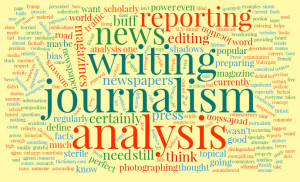As you may have heard, I’m writing a book. One of the writers that agreed to contribute said that his specialty was journalism – the problem is that he didn’t answer my questions with information I would think of as being from a journalist. So, I thought maybe I wasn’t defining the word properly. So, I went to my dear friend Dictionary.com. (It’s been awhile since I’ve done a “define the word” blog!)
To be honest, I wasn’t entirely pleased with the results:
- the occupation of reporting, writing, editing, photographing, or broadcasting news or of conducting any news organization as a business.
- a course of study preparing students for careers in reporting, writing, and editing for newspapers and magazines.
- writing that reflects superficial thought and research, a popular slant, and hurried composition, conceived of as exemplifying topical newspaper or popular magazine writing as distinguished from scholarly writing:
He calls himself a historian, but his books are mere journalism.
Scrolling down the page some, I came across the “British Dictionary” section. Not much different, definitely more succinct:
- the profession or practice of reporting about, photographing, or editing news stories for one of the mass media
- newspapers and magazines collectively; the press
- the material published in a newspaper, magazine, etc:
this is badly written journalism - news reports presented factually without analysis
OK, so why was I unhappy with the answers?
 The lack of respect.
The lack of respect.
I’m used to sterile definitions, but the idea that journalism is superficial and without analysis is astounding to me! And my astonishment has nothing to do with the fact that I’m currently living in the middle of the biggest journalistic S**T storm in more than just my lifetime. (Bush v Gore and Watergate were good, but I think Donald Trump takes the cake.)
If we have to go with sterile, then let’s go with the more generic definition from Oxford Living Dictionaries:
The activity or profession of writing for newspapers, magazines, or news websites or preparing news to be broadcast
I do agree that there are superficial publications (Weekly World News anyone?) and there are certainly superficial reporters – but let’s not define a concept with a few bad examples.
Now, even if we assume that I’m offended by “superficial” because my writing certainly falls more into the “topical” than “scholarly” writing category and I don’t want people to think of me as superficial, there is still the “without analysis” issue.
In a perfect world, all journalism would be strictly factual, without bias, and still provide analysis. I’m sorry, we are not all history, political, or even a current events buffs, why do I need to know these facts? Analysis connects the dots.
Yes, “without bias” is almost impossible when providing analysis – but this isn’t a perfect world. I still want someone to tell me about potential consequences of “the news.”
OK, a traffic accident during commute hours does not need much analysis – it needs reporting so that other commuters know why they’re stuck or to take alternate routes. Yet, if traffic accidents are regularly occurring in a certain location, then maybe we do need some analysis. Does the road do something weird in that location? Is there an SUV-eating pothole? Are there odd shadows that cause confusion? Are there not enough shadows, and everyone is going blind in that one spot? Are zombies regularly entering the road there?
In high school journalism, it was drilled into me that good reporting answers who, what, when, where, why, and how. Analysis helps us with how and certainly with why. (How did we get to this state of affairs? Why are affairs in this state?)
I believe in and am grateful for the power of a free press (especially with what is currently going on in the US government) and a significant portion of that power comes from the analysis of the facts the press is reporting.
-Lorrie Nicoles
